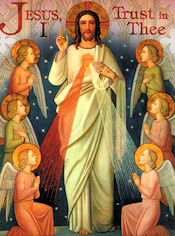Catholic Activity: Plenary Indulgence for Divine Mercy Sunday

Here are the details about the plenary indulgence that is possible to gain on Divine Mercy Sunday, the Sunday after Easter.
DIRECTIONS
In a decree dated August 3, 2002, the Apostolic Penitentiary announced that in order "to ensure that the faithful would observe this day (Divine Mercy Sunday) with intense devotion, the Supreme Pontiff himself established that this Sunday be enriched by a plenary indulgence…so that the faithful might receive in great abundance the gift of the consolation of the Holy Spirit. In this way, they can foster a growing love for God and for their neighbor, and after they have obtained God's pardon, they in turn might be persuaded to show a prompt pardon to their brothers and sisters."
The plenary indulgence is granted under the usual conditions (sacramental confession, Eucharistic communion and prayer for the intentions of Supreme Pontiff) to the faithful who, on the Second Sunday of Easter or Divine Mercy Sunday, in any church or chapel, in a spirit that is completely detached from the affection for a sin, even a venial sin, take part in the prayers and devotions held in honor of Divine Mercy, or who, in the presence of the Blessed Sacrament exposed or reserved in the tabernacle, recite the Our Father and the Creed, adding a devout prayer to the merciful Lord Jesus (e.g. Merciful Jesus, I trust in you!).
Additional provisions are offered for those who are impeded from fulfilling these requirements, but wish to acquire the plenary indulgence.
The Second Sunday of Easter in the new Missale Romanum bears the name, "DOMINICA II PASCHÆ seu de divina Misericordia." While the readings and prayers for Mass on this day remain unchanged, the decree of the Apostolic Penitentiary gives guidance to preachers as they reflect on the mystery of Divine Mercy:
The Gospel of the Second Sunday of Easter narrates the wonderful things Christ the Lord accomplished on the day of the Resurrection during his first public appearance: "On the evening of that day, the first day of the week, the doors being shut where the disciples were, for fear of the Jews, Jesus came and stood among them and said to them, ‘Peace be with you.' When he said this, he showed them his hands and his side. Then the disciples were glad to see the Lord. Jesus said to them again, ‘Peace be with you. As the Father has sent me, even so I send you,' and then he breathed on them, and said, ‘Receive the Holy Spirit. If you forgive the sins of any, they are forgiven; if you retain the sins of any, they are retained'" (Jn 20,19-23).
In addition, the decree requires that parish priests "should inform the faithful in the most suitable way of the Church's salutary provision. They should promptly and generously be willing to hear their confessions. On Divine Mercy Sunday, after celebrating Mass or Vespers, or during devotions in honor of Divine Mercy, with the dignity that is in accord with the rite, they should lead the recitation of the prayers that have been given above. Finally, since ‘Blessed are the merciful, for they shall obtain mercy' (Mt 5,7), when they instruct their people, priests should gently encourage the faithful to practice works of charity or mercy as often as they can, following the example of, and in obeying the commandment of Jesus Christ, as is listed for the second general concession of indulgence in the Enchiridion Indulgentiarum."






